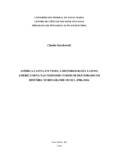| dc.creator | Kuczkowski, Claudio | |
| dc.date.accessioned | 2020-02-07T16:07:40Z | |
| dc.date.available | 2020-02-07T16:07:40Z | |
| dc.date.issued | 2019-08-27 | |
| dc.identifier.uri | http://repositorio.ufsm.br/handle/1/19524 | |
| dc.description.abstract | The work “Latin America in theses: the latin americanist historiography in the theses of the doctoral courses in History in Rio Grande do Sul” adopts as its object the analysis of the seventy-two theses about Latin America developed in the Postgraduate Programs in History – Doctoral level – in Rio Grande do Sul, from 1986 to 2016. Chronologically goes back to the creation of the Doctorate Course in History at the Pontifícia Universidade Católica do Rio Grande do Sul (1986) – the oldest of the three programs – and extends to the year 2016, passing the development of doctoral courses in the same area at the Universidade Federal do Rio Grande do Sul (1995) and at the Universidade do Vale do Rio dos Sinos (1999). The spatial cut is justified by the geographical and border conditions of the state of Rio Grande do Sul, the temporal, in the course of the Postgraduate Programs in Brazil, and the thematic, in the opportunity for reflection on the production of regional historical knowledge. To this end, the priority is to examine the structure of the theses on Latin America produced in the period, based on the five guiding points indicated by the works of Jörn Rüsen and his proposal for the matrix of historical thought. The question, “to what extent does a movement of epistemological transformation occur during the development of theses?” should be answered from the hypothesis of the existence of structuring hierarchies within the academic work, between Needs of Orientation, Conceptions, Methods, Forms and Functions of Orientation, to be confirmed through the matrix of historical thought in its relation to the set of theses. The methodology is based on the comparison, in the first instance, within each thesis, and then the comparison between theses, in the same variables, in order to perceive global ruptures and continuities, as well as the identification of their possible endogenous and exogenous causes. | eng |
| dc.language | por | por |
| dc.publisher | Universidade Federal de Santa Maria | por |
| dc.rights | Attribution-NonCommercial-NoDerivatives 4.0 International | * |
| dc.rights.uri | http://creativecommons.org/licenses/by-nc-nd/4.0/ | * |
| dc.subject | Teses em história da América Latina | por |
| dc.subject | Produção teórica e historiográfica no RS | por |
| dc.subject | Matriz do pensamento histórico rüseniano | por |
| dc.subject | Theses in Latin American history | eng |
| dc.subject | Theoretical and historiographic production in RS | eng |
| dc.subject | Matrix of rüsenian historical thought | eng |
| dc.title | América Latina em teses: a historiografia latino-americanista nas teses dos cursos de doutorado em história no Rio Grande do Sul (1986-2016) | por |
| dc.title.alternative | Latin America in theses: the latin americanist historiography in the theses of the doctoral courses in history in Rio Grande do Sul | eng |
| dc.type | Tese | por |
| dc.description.resumo | O trabalho “América Latina em teses: a historiografia latino-americanista nas teses dos cursos de doutorado em História no Rio Grande do Sul” adota como objeto a análise das setenta e duas teses sobre a América Latina desenvolvidas nos Programas de Pós-Graduação em História – nível de doutorado – no Rio Grande do Sul, entre os anos de 1986 e 2016. Retrocede, cronologicamente, à criação do curso de doutorado em História na Pontifícia Universidade Católica do Rio Grande do Sul (1986) – o mais antigo dos três programas – e se estende até o ano de 2016, perpassando o desenvolvimento dos cursos de doutorado na mesma área na Universidade Federal do Rio Grande do Sul (1995) e na Universidade do Vale do Rio dos Sinos (1999). O recorte espacial encontra justificativa na condição geográfica e fronteiriça do estado do Rio Grande do Sul, o temporal, no percurso dos Programas de Pós-Graduação no Brasil e, o temático, na oportunidade de reflexão sobre a produção do conhecimento histórico regional. Nesse intuito, estabelece-se como prioridade o exame de estrutura das teses sobre a América Latina produzidas no período, a partir dos cinco pontos norteadores indicados pelos trabalhos de Jörn Rüsen e sua proposta de matriz do pensamento histórico. A pergunta, “em que medida ocorre um movimento de transformação epistemológica durante o desenvolvimento das teses?” deverá ser respondida a partir da hipótese da existência de hierarquias estruturantes no interior do trabalho acadêmico, entre Carências de Orientação, Concepções, Métodos, Formas e Funções de Orientação, a serem confirmadas por meio da matriz do pensamento histórico na sua relação ao conjunto de teses. A metodologia tem como base a comparação, em primeira instância, no interior de cada tese, e, em seguida, o cotejo entre as teses, nas mesmas variáveis, a fim de perceber rupturas e continuidades globais, além da identificação de suas possíveis causas endógenas e exógenas. | por |
| dc.contributor.advisor1 | Armani, Carlos Henrique | |
| dc.contributor.advisor1Lattes | http://lattes.cnpq.br/3735821554238929 | por |
| dc.contributor.referee1 | Martins, Estevao Chaves de Rezende | |
| dc.contributor.referee1Lattes | http://lattes.cnpq.br/8217850863705574 | por |
| dc.contributor.referee2 | Diehl, Astor Antônio | |
| dc.contributor.referee2Lattes | http://lattes.cnpq.br/4106525822499548 | por |
| dc.contributor.referee3 | Fertig, Andre Atila | |
| dc.contributor.referee3Lattes | http://lattes.cnpq.br/3540806006548690 | por |
| dc.contributor.referee4 | Remedi, José Martinho Rodrigues | |
| dc.contributor.referee4Lattes | http://lattes.cnpq.br/4112671771507306 | por |
| dc.creator.Lattes | http://lattes.cnpq.br/4625554978855540 | por |
| dc.publisher.country | Brasil | por |
| dc.publisher.department | História | por |
| dc.publisher.initials | UFSM | por |
| dc.publisher.program | Programa de Pós-Graduação em História | por |
| dc.subject.cnpq | CNPQ::CIENCIAS HUMANAS::EDUCACAO | por |
| dc.publisher.unidade | Centro de Ciências Sociais e Humanas | por |



